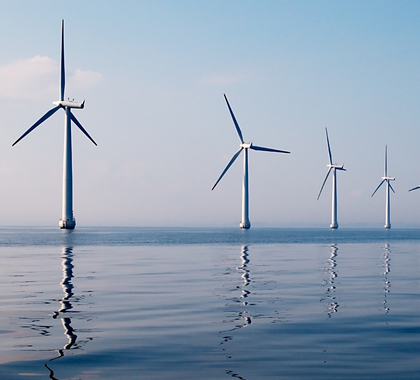New Jersey Gov. Phil Murphy signed an executive order to raise the state’s goal of electric power generated from offshore wind power to 7,500 megawatts by 2035.
The November order increases the state’s goal for offshore wind-generated electricity from the 3,500 megawatts the state had originally set as a goal for 2030.
In June the state Board of Public Utilities approved a $1.6 billion wind-energy farm to be built about 15 miles off the coast of Atlantic City as part of the effort to meet the earlier goal.
Big Promise
At a news conference announcing the executive order, Murphy said offshore wind will generate enough electricity to meet more than 50 percent of the state’s demand for electric power.
“Think about it for a second: When we meet this goal, our offshore winds will generate enough electricity to power more than 3.2 million New Jersey homes,” Murphy said. “We will meet half of our electric power need.”
Former vice president and climate change activist Al Gore appeared alongside Murphy at the new conference, praising him and comparing the fight against climate change to Pearl Harbor, the Battle of the Bulge, and the 9/11 terrorist attacks.
Studies Cast Doubt
The governor’s signature climate change effort is a bad idea for New Jersey’s residents and businesses, as four different studies performed between 2008 and 2012 show offshore wind energy will come at a high cost, says John Droz, executive director of the Alliance for Wise Energy Decisions.
A study conducted by the state of New Jersey in 2008 and two others performed by consultants on behalf of the state in 2012 each concluded generating power from offshore wind industrial facilities would result in higher energy costs, lost jobs, and economic flight. The results of New Jersey’s analyses of the net economic liability of offshore wind were confirmed by a fourth study conducted by the Beacon Hill Institute in 2011.
“No other state in the country has four studies showing wind power is bad for consumers, the military, and the environment,” Droz said.
Calls for Consumer Protests
Wind-generated electricity is a bad choice for a variety of reasons, says Rob Bradley Jr., CEO and founder of the Institute for Energy Research.
“Offshore wind power is the most expensive form of a noncompetitive technology to generate electricity, as well as being a visual blight,” Bradley said. “Massive government subsidies are required, which explains why Gov. Murphy is turning to central planning and mandating a wind power capacity quota.
“Utilities should not buy the extravagant power, and consumers beholden to the utilities should protest as well,” Bradley said.
Expensive Backup
Neither Murphy nor Gore will admit wind energy is necessarily part-time energy requiring backup by other sources, Droz says.
“If you have a 100 megawatt offshore wind farm, someplace onshore there is a 100 megawatt gas facility that is 100 percent of the time paired to it because wind is constantly fluctuating all of the time and can go to zero quickly, so when it goes to zero, something has to be there because the grid has to be balanced every fraction of a second,” Droz said. “So if 100 megawatts drops off because of a lull in wind, what do you expect them to do, let Hoboken go black until the wind picks up again?
“Of course, the governor and his team and the people in the business know this, and have considered it, making the whole thing a scam, a deception nobody acknowledges publicly,” Droz said.
Politics Over Science
Meeting New Jersey’s energy needs should be strictly a technical and engineering issue, says Droz, but politics gets in the way.
“We have to acknowledge electrical energy choice is a complex technical problem, and for any technical problem we have, the answer should be found in science,” Droz said. “The only energy policy which makes sense for New Jersey is one based on science.
“Therein lies the problem, because nothing in New Jersey’s energy policy is based on science, which, to be fair, isn’t just true in New Jersey, it applies to New York and other states as well,” Droz said. “Their energy policies are written by special interest lobbyists, and any connection to science is inadvertent and accidental.”
Droz says special interests control the state’s energy policies.
“If there were any scientists involved in this process they would say, ‘Hey, this is stupid,'” Droz said. “New Jersey’s energy policy is written by lobbyists and so-called environmental groups, who call themselves ‘stakeholders,’ but there is no stakeholder representing the public, or ratepayers, or the military, or the environment, or anybody else when these policies are developed—only special-interest stakeholders need apply to shape New Jersey’s energy policy.”
Kenneth Artz ([email protected]) writes from Dallas, Texas.
Official Connections:
New Jersey Gov. Phil Murphy (D): https://nj.gov/governor/; https://nj.gov/governor/contact/all/


